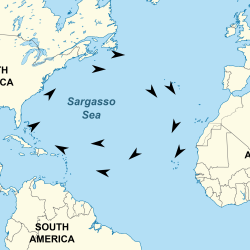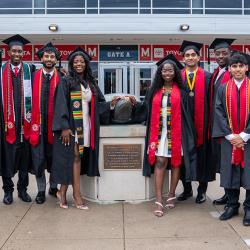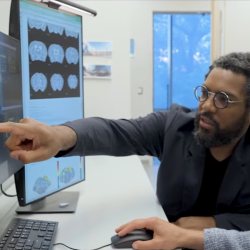A Prolific Legacy: Biology’s Arthur Popper Publishes 67th Book in Auditory Research Series
Popper, who retired in 2014, remains involved in research on hearing and on the effects of man-made sound on marine life
How many books does it take to cover the science of hearing? In 1990, Arthur Popper—a research professor emeritus of biology at the University of Maryland—thought that eight books would do the job.
 Twenty-eight years later, Popper has co-edited 67 volumes of the Springer Handbook of Auditory Research (SHAR) with retired Loyola University Psychology Professor Richard Fay. Springer Publishing Company released the latest book—Rodent Bioacoustics—in September 2018. The first volume, The Mammalian Auditory Pathway: Neuroanatomy, came out in 1992.
Twenty-eight years later, Popper has co-edited 67 volumes of the Springer Handbook of Auditory Research (SHAR) with retired Loyola University Psychology Professor Richard Fay. Springer Publishing Company released the latest book—Rodent Bioacoustics—in September 2018. The first volume, The Mammalian Auditory Pathway: Neuroanatomy, came out in 1992.
“Right now, we might be looking at a hundred books in the series,” Popper said.
In addition to co-editing the series, Popper and Fay recruit scientists—including some from UMD—to edit books in the series that cover topics on which Popper and Fay are not experts. Subjects range from the evolution of hearing to music perception to age-related hearing loss.
“Editing the books has made me more aware of the breadth of the field of hearing,” Popper said. “A lot of scientists focus only on their own work. The books allow me to be conversant, and they’ve allowed me to get to know a good portion of the people in the field.”
Popper, who received his B.S. in biology from New York University, joined UMD in 1987. He studied hearing for his entire research career, starting with his Ph.D. work at the City University of New York. At UMD, his research focused on hearing in aquatic organisms such as fishes.
“I’m excited by hearing because it’s fascinating to think about why we evolved it,” Popper said. “We didn’t evolve hearing for communication; we actually evolved it for being aware of the acoustic environment. No sense gives you such a long-distance concept of the world like hearing does.”
Beyond performing his own research, Popper co-founded the Center for Comparative and Evolutionary Biology of Hearing at UMD with Psychology Professor Emeritus Robert Dooling. In 1996, Popper and Dooling successfully applied for UMD’s first National Institutes of Health training grant to support the center. The grant is now entering its 22nd year, with Distinguished University Professor of Biology Catherine Carr and Hearing and Speech Sciences Professor Sandra Gordon-Salant as co-principal investigators. The program has supported more than a hundred UMD graduate students and postdocs, many of whom have gone on to careers in auditory neuroscience.
“I believe we have the one of the most outstanding auditory research groups in the world here at Maryland,” said Popper, who published over 250 papers and received more than 50 research grants before he retired in 2014. In 1996, Popper received the Outstanding Faculty Research Award from the university’s College of Life Sciences.
Outside of his laboratory, Popper supported science education, which culminated in his co-founding of Terrapin Teachers in 2014. Terrapin Teachers is a UMD program that aims to increase the number of highly qualified secondary science and mathematics teachers. In addition to earning a science or math degree, students who complete the program are eligible for certification as a middle or high school teacher. Based on the national UTeach model, Terrapin Teachers is a joint initiative between UMD’s College of Education and the College of Computer, Mathematical, and Natural Sciences.
“To me, Terrapin Teachers is the most important outreach program that the college does,” Popper said.
 Popper remains active in auditory research in his retirement, focusing on the impact of man-made noise on marine life. He conducts U.S. Navy-funded research on how underwater explosions affect ocean fishes. Popper also coordinates The Effects of Noise on Aquatic Life conferences; consults on acoustic research projects; and serves as editor of the magazine Acoustics Today, a publication of the Acoustical Society of America.
Popper remains active in auditory research in his retirement, focusing on the impact of man-made noise on marine life. He conducts U.S. Navy-funded research on how underwater explosions affect ocean fishes. Popper also coordinates The Effects of Noise on Aquatic Life conferences; consults on acoustic research projects; and serves as editor of the magazine Acoustics Today, a publication of the Acoustical Society of America.
“When you’re retired, you need something to keep you off the street, so I keep working,” Popper quipped.
Although Popper and Fay have no immediate plans to retire from co-editing SHAR, the two have chosen new editors to one day succeed them. One of them will be Popper’s former student, Allison Coffin (Ph.D. ’05, biology), an associate professor of neuroscience at Washington State University Vancouver.
The SHAR volumes—many of which have been purchased or downloaded tens of thousands of times—are likely to have a broader and more lasting impact on science than most research papers, according to Popper.
“Scientific papers don’t have a long shelf life, and only a small group of people are interested in my particular field of research,” Popper said. “But even today, my SHAR book from 1992 is being cited and downloaded. I’d say the series is my legacy as a scientist.”
###
Media Relations Contact: Irene Ying, 301-405-5204, zying@umd.edu
University of Maryland
College of Computer, Mathematical, and Natural Sciences
2300 Symons Hall
College Park, MD 20742
www.cmns.umd.edu
@UMDscience
About the College of Computer, Mathematical, and Natural Sciences
The College of Computer, Mathematical, and Natural Sciences at the University of Maryland educates more than 9,000 future scientific leaders in its undergraduate and graduate programs each year. The college’s 10 departments and more than a dozen interdisciplinary research centers foster scientific discovery with annual sponsored research funding exceeding $175 million.







